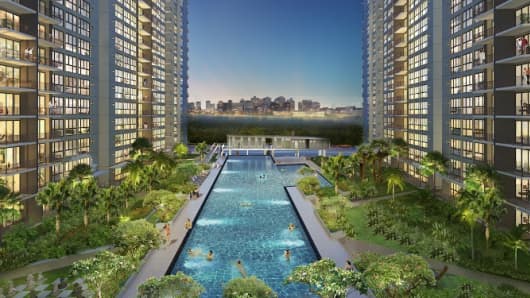What will the next generation of urban housing look like? Think ultra-connected, convenient and sustainable. Lake Life, an executive condominium under development in Singapore, provides a glimpse into housing of the not-so-distant future.
From an electric car charging bay, free Wi-Fi in common areas and a mobile application to book condominium facilities to a communal urban farming garden and dedicated pet waste disposal station – the condo's developer Evia Real Estate aims to push the envelope when it comes to "smart living."
Related: How to Get the Most for Your Home Improvement Money
"I've always been a promoter of using technology for enhancing lifestyle," Vincent Ong, managing partner at Evia Real Estate told CNBC. "Housing is one piece in the jigsaw puzzle to make a smart city work," said Ong, who is a tech-entrepreneur-turned-property-developer.

Lake Life, which will be ready for occupation in 2018, is located in Jurong Lake District – a former industrial neighborhood that was recently designated as the test-bed for smart city initiatives. A number of pilot projects are underway in the area, including the deployment of sensors to monitor the length of taxi queues, adjust park lighting based on time of day and determine the cleanliness of public areas, the most effective of which will be implemented on a larger scale. Singapore strives to become the world's first smart nation within the next decade.
The response to the new condo development is encouraging; 533 of its 546 units have been sold since sales began in November 2014. The average sales priced based on caveats lodged is 870 Singapore dollars ($642) per square foot, which is higher than typical 800 Singapore dollars achieved in most other recently launched executive condominium projects.
Related: 11 Home Trends for 2015
Emerging Trend
Executive condominium is the term used to describe developments that are a hybrid between private and public housing, where after the minimum occupation period of five years, they can be sold on the private property market and after 10 years, they acquire a "privatized" status can be sold to foreigners. Ong Teck Hui, national director of research and consultancy at JLL Singapore says smart features are becoming more commonplace in residential developments across developed countries. "Smart housing is just being in line with lifestyle changes brought about by technological changes," Ong said.
"The experience of leading cities in developed countries is the gradual growth of smart features in homes including climate control, energy, safety and security," he said.
A setback when technology becomes such an integral part of a development, however, is that it becomes outdated as it ages, Ong of JLL said. To this, Ong of Evia Real Estate responded that systems in his condominium can be updated as technology advances.
New Age, Not Cutting Edge
Chen Khong Tham, associate professor, at the Department of Electrical and Computer Engineering at National University of Singapore says while like Lake Life is a unique value proposition, he expects homes of the future to be even smarter.
Related: The Hidden Threats from Your Smart Home
"Features in Lake Life are fairly mainstream, we can go even more high-tech than what they have," Chen said.
"In the research community, we've looked at even smarter homes. In these homes, we would have activity monitoring and recognition systems to see how occupants are behaving. Like with the elderly, for example, we would be able to track whether they have had their meals, or whether they have fallen down and need emergency help," he said.
Trials with activity monitoring systems are currently being carried out in Europe and the United States, says Chen. Nevertheless, he says Lake Life and its neighborhood Jurong Lake District is undoubtedly a space to watch. "This is a very useful point of reference as to what the future may look like," he said.
This article originally appeared in CNBC.
Read more at CNBC:
Fed's Dudley hopeful on US rate hike this year|
Gasoline, shelter costs lift US consumer prices
US consumer sentiment rises in April




